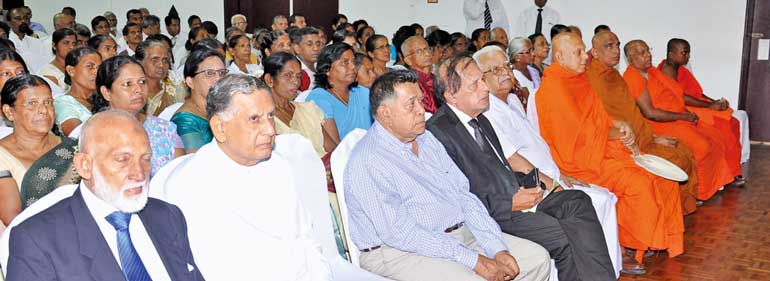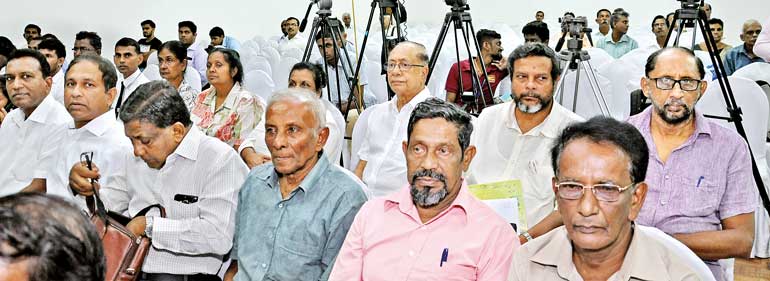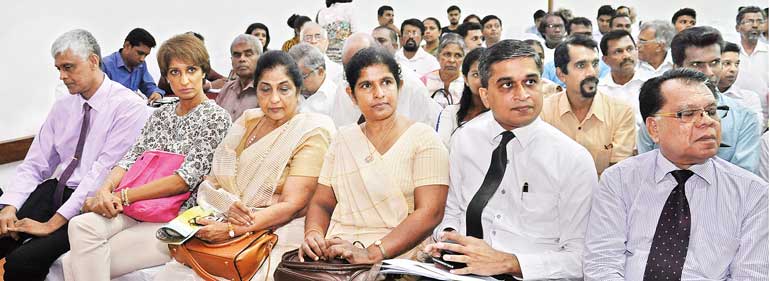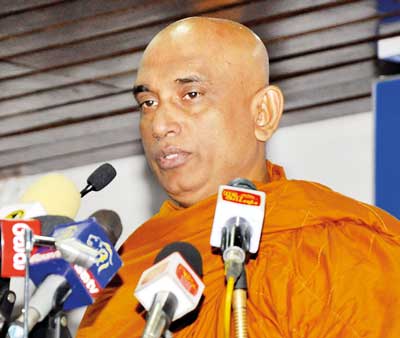Friday Feb 27, 2026
Friday Feb 27, 2026
Monday, 15 August 2016 00:01 - - {{hitsCtrl.values.hits}}



 By Devin Jaysundera
By Devin Jaysundera
The controversial weedicide ban which has irked the plantation industry in the country was furthered strengthened when the principal instigator against toxin treatment in agriculture Presidential Adviser and JHU Parliamentarian Athuraliya Rathana Thero announced that he was seeking to extend the ban to pesticides and chemical fertilisers as part of the Government’s efforts of creating a toxin-free nation.
“Our first challenge is stop the use of all weedicides. At this point we have banned primary weedicides such as Roundup, but there are other weedicides that are used for secondary treatment that also need to be prohibited,” said Rathana Thero.
He added that pesticides and chemical fertilisers were also in line to be prohibited in the future. “The World Health Organization (WHO) has indicated that there is a significant amount of arsenic and cadmium in the widely-used chemical fertiliser triple  superphosphate (TSP). I believe that we can completely eliminate the use of chemical fertiliser and produce our own alternative.”
superphosphate (TSP). I believe that we can completely eliminate the use of chemical fertiliser and produce our own alternative.”
However the Strategic Enterprise Management Agency (SEMA), the leading State authority in spearheading the toxin-free project, is opting for a leaner stance, claiming that further banning is not a viable option.
“Instead of banning, we will make sure that farmers are comfortable with organic agriculture,” said SEMA Chairman Asoka Abeygunawardana. “We will be having an intensive programme to educate the farmers to build up their confidence for a gradual transition from chemical to organic.”
According to a report published by SEMA, in the 2014/15 Maha season, 63.7% of the paddy cultivation exclusively used chemical fertiliser whilst 35.3% used a combination of both organic and chemical fertiliser. The agency argues that the Rs. 35 billion subsidy provided exclusively for agro-chemicals is the main reason why farmers are reluctant to move away from chemical fertilisers.
With the Government now granting a cash allowance instead of the traditional fertiliser subsidy, the agency believes that farmers have the option to choose on the nature of the fertiliser.
“The farmer has the freedom now. We are sure that we can compete with chemical fertiliser and convince them to go in our direction,” said Abeygunawardana. “In the long run with organic agriculture the subsidy requirement will be minimal as the soil condition will be improved,” he added.
As alternatives SEMA plans to reinvigorate the use of indigenous seeds and introduce biological agents for pest control. The agency intends to cultivate toxic-free paddy in 35,000 hectares in 2016/17 Maha season.
Sri Lanka became the first country to ban the popular weed killer glyphosate which goes under the trade name ‘Roundup’, primarily manufactured by US agri-tech giant, Monsanto.
The plantation sector criticised the Government’s decision arguing the case of increase in cost of production due to reduced efficiency in weed removal and the use of human-intensive labour. Abeygunawardana says glyphosate was used as a one-stop solution to clear the lands which resulted in deteriorating the quality of the soil. He insisted that plantations should shift in to mechanical weed removal systems and assured that it has same level of productivity as any other weedicide.
Glyphosate has been in hot water in the recent years with conflicting reports from world health and food regulating agencies. Last year the cancer research arm of the World Health Organization (WHO) classified glyphosate as a carcinogenic threat to humans. However, a recently-appointed expert panel by the WHO and the Food and Agriculture Organization (FAO) contradicted the earlier claim, concluding that glyphosate was unlikely to pose a carcinogenic risk to humans from exposure through the diet.
Locally too opinion is split on the effects of glyphosate. The scientists at universities of Rajarata and Peradeniya have been at odds with each other, with the former linking glyphosate as the root cause for chronic kidney disease and the latter vehemently refuted the findings.
When Daily FT inquired whether there was a possibility of reversing the decision on glyphosate by appointing a review committee, Abeygunawardana doubted the authenticity of the study, commenting “they are paid by the multinational agencies”.
Pix by Lasantha Kumara